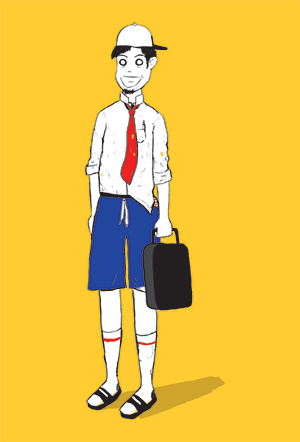Dress for success

Dress for Success
As a commuting student, Julie Sweitzer, junior computer information systems major, must dress appropriately for not only the weather, but also for professional experiences throughout the day.
Sweitzer said she doesn’t have the luxury to go to her residence hall and change, so she has to dress functionally for different parts of the day.
“I wear clothing that can function on double duty, from class meetings to business meetings,” she said.
As the chief financial advisor of the Business Professionals Roundtable and member of Sigma Alpha Pi, a leadership fraternity, Sweitzer said she usually wears jeans, a polo, boots or boat shoes to classes to function comfortably, yet still remain professional for any events she might have to attend.
Sweitzer said even makes sure she has appropriate clothing on for her classes.
“I don’t think less of students that dress lazily for class, but I also don’t think highly of them,” Sweitzer said. “I understand the want to be comfortable in class, but I do believe that how you dress affects how you present yourself and what others think of you.”
Paul Csizmadia, junior business management major and photo stringer for the Daily Kent Stater, photographed Education Super Start, a job presentation for education majors on jobs and resources, in February where he was asked to avoid photographing those not dressed appropriately.
“Right when I began to take photos, the woman who was running it was really adamant that I only take photos of people in professional dress,” Csizmadia said. “I asked her, ‘Why is that?’ and she said she was very disappointed that not a lot of people were in professional dress.”
Csizmadia said he tried to photograph only men in suits and women in appropriate-length skirts and blazers.
Yvette Clayton, a management and information systems lecturer and career advisor for the College of Business Administration’s Career Service Office, said students don’t understand the concept of appropriate dress.
“I see a lot of students go to career fairs in jeans and I’ve even seen shorts before,” Clayton said. “You’re in front of a potential employer and I think what students don’t understand is that even though you may not have been in there looking for a job, you still need to dress professionally because it’s that first impression.”
Clayton said she suggests students can never be overdressed, but they can always be underdressed, especially when it comes to job interviews or career fairs.
“You should always dress in a suit,” Clayton said. “So never wear khakis and a polo for an interview. Always dress professionally, you want to give your best first impression when you’re walking in.”
Clayton said business-casual dress depends on the professional and employer so always dress for a good first impression and wait to dress down until dress code guidelines have been set.
“I’ve talked to other professionals and I don’t think there has been anything defined as business casual,” Clayton said. “One company can be different from another company. Somebody’s business casual could be khakis and a nice shirt, somebody else’s could be a tie and no jacket, so it really depends on the company or organization.”
Sweitzer said she doesn’t think students know how to dress professionally and that it is worth learning about.
“We need to educate more students on how to properly dress for different types of events, while keeping in mind that not all students may be able to afford the apparel,” Sweitzer said. “We need them to know that it is not because they enjoy taking the extra time to dress correctly, but it is how people respond to them when they are dressed correctly.”
Clayton said females should never wear leggings, shorts above the knee or stilettos to a professional event, while men should never wear khakis or jeans.
“Stay conservative. Get rid of the piercings, don’t have tattoos showing, and there is no need for the stilettos,” Clayton said.
Clayton said that dressing appropriately has become a bonus, not a given.
“If you dress professionally, you’re going to stand out because not a lot of people do that,” Clayton said. “It’s all about first impressions.”
Contact Lindsay Miller at [email protected].

